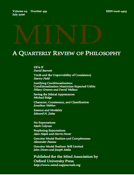-
Views
-
Cite
Cite
Jonathan Webber, Character, Consistency, and Classification, Mind, Volume 115, Issue 459, July 2006, Pages 651–658, https://doi.org/10.1093/mind/fzl651
Close - Share Icon Share
Abstract
John Doris has recently argued that since we do not possess character traits as traditionally conceived, virtue ethics is rooted in a false empirical presupposition. Gopal Sreenivasan has claimed, in a paper in Mind, that Doris has not provided suitable evidence for his empirical claim. But the experiment Sreenivasan focuses on is not one that Doris employs, and neither is it relevantly similar in structure. The confusion arises because both authors use the phrase ‘cross-situational consistency’ to describe the aspect of character traits that they are concerned with, but neither defines this phrase, and it is ambiguous: Doris uses it in one sense, Sreenivasan in another. Partly for this reason, the objections Sreenivasan raises fail to block the argument Doris provides. In particular, the most reliable data Doris employs, Milgram’s famous study of authority, is entirely immune to Sreenivasan’s objections. Sreenivasan has not shown, therefore, that Doris provides unsuitable evidence for his claim.



